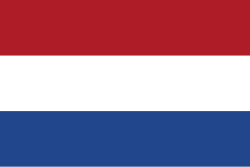Our website is made possible by displaying online advertisements to our visitors.
Please consider supporting us by disabling your ad blocker.
History of the Netherlands
| History of the Netherlands |
|---|
 |
|
|
The history of the Netherlands extends back long before the founding of the modern Kingdom of the Netherlands in 1815 after the defeat of Napoleon. For thousands of years, people have been living together around the river deltas of this section of the North Sea coast. Records begin with the four centuries during which the region formed a militarized border zone of the Roman Empire. As the Western Roman Empire collapsed and the Middle Ages began, three dominant Germanic peoples coalesced in the area – Frisians in the north and coastal areas, Low Saxons in the northeast, and the Franks to the south. By 800, the Frankish Carolingian dynasty had once again integrated the area into an empire covering a large part of Western Europe. The region was part of the duchy of Lower Lotharingia within the Holy Roman Empire, but neither the empire nor the duchy were governed in a centralized manner. For several centuries, medieval lordships such as Brabant, Holland, Zeeland, Friesland, Guelders and others held a changing patchwork of territories.
By 1433, the Duke of Burgundy had assumed control over most of Lower Lotharingia, creating the Burgundian Netherlands. This included what is now the Netherlands, Belgium, Luxembourg, and a part of France. When their heirs the Catholic kings of Spain took strong measures against Protestantism, the subsequent Dutch revolt led to the splitting in 1581 of the Netherlands into southern and northern parts. The southern "Spanish Netherlands" corresponds approximately to modern Belgium and Luxembourg, and the northern "United Provinces" (or "Dutch Republic)", which spoke Dutch and was predominantly Protestant, was the predecessor of the modern Netherlands.
In the Dutch Golden Age, which had its zenith around 1667, there was a flowering of trade, industry, and the sciences. The Dutch Republic practiced religious toleration and Amsterdam attracted Portuguese Jews, many of whom were merchants, that practiced their religion and engaged in economic activity.[1][2] A rich worldwide Dutch empire developed in Asia and the Americas. The Dutch East India Company, based on its English counterpart, was founded. During the eighteenth century, the power, wealth and influence of the Netherlands declined. A series of wars with the more powerful British and French neighbours weakened it. The English seized the North American colony of New Amsterdam, and renamed it "New York". There was growing unrest and conflict between the Orangists and the Patriots. The French Revolution spilled over after 1789, and a pro-French Batavian Republic was established in 1795–1806. Napoleon made it a satellite state, the Kingdom of Holland (1806–1810), and later simply a French imperial province.
After the defeat of Napoleon in 1813–1815, an expanded "United Kingdom of the Netherlands" was created with the House of Orange as monarchs, also ruling Belgium and Luxembourg. After the King imposed unpopular Protestant reforms on Belgium, it left the kingdom in 1830 and new borders were agreed in 1839. After an initially conservative period, following the introduction of the 1848 constitution, the country became a parliamentary democracy with a constitutional monarch. Modern-day Luxembourg became officially independent of the Netherlands in 1839, but a personal union remained until 1890. Since 1890, it is ruled by another branch of the same dynasty.
The Netherlands was neutral during the First World War, but during the Second World War, it was invaded and occupied by Nazi Germany. The Nazis, including many collaborators, rounded up and killed almost all of the country's Jewish population. When the Dutch resistance increased, the Nazis cut off food supplies to much of the country, causing severe starvation in 1944–1945. In 1942, the Dutch East Indies were conquered by Japan, but prior to this the Dutch destroyed the oil wells for which Japan was desperate. Indonesia proclaimed its independence from the Netherlands in 1945, followed by Suriname in 1975. The post-war years saw rapid economic recovery (helped by the American Marshall Plan), followed by the introduction of a welfare state during an era of peace and prosperity. The Netherlands formed a new economic alliance with Belgium and Luxembourg, the Benelux, and all three became founding members of the European Union and NATO. In recent decades, the Dutch economy has been closely linked to that of Germany and is highly prosperous. The four countries adopted the euro on 1 January 2002, along with eight other EU member states.
- ^ Bodian, Miriam. Hebrews of the Portuguese Nation: Conversos and Community in Early Modern Amsterdam. Bloomington: Indiana University Press 1997
- ^ Swetchinski, Daniel M. Reluctant Cosmopolitans: The Portuguese Jews of Seventeenth-Century Amsterdam. London: Littman Library of Jewish Civilization 2000
Previous Page Next Page


